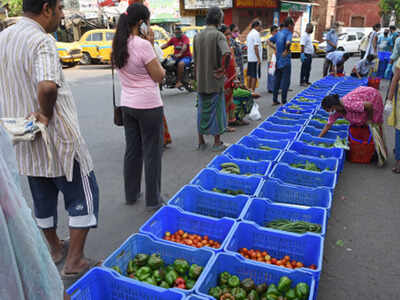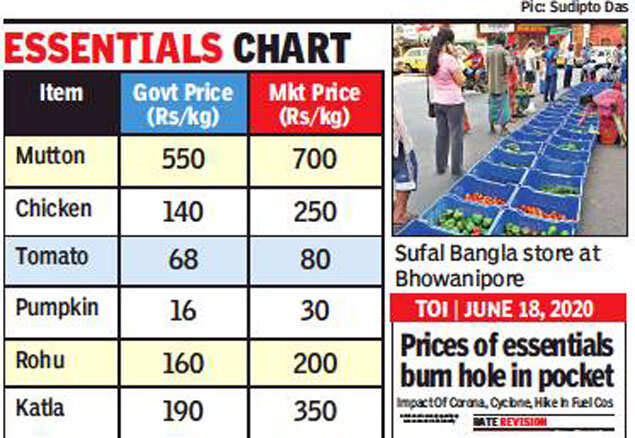
KOLKATA: At a time when prices of almost everything have been pushed up by lockdown, Amphan and high diesel price, state-run retail outlets, like those of Haringhata Meat, Sufal Bangla and state fisheries, have been selling essentials, including vegetables, meat and fish, at affordable rates. No wonder the government outlets have been doing brisk business, while many major chains have apparently been witnessing a drop in footfalls.
Haringhata Meat has recorded a 100% jump in business owing to the low rates. It has been selling mutton at Rs 550 a kg and chicken at Rs 140 a kg, registering a price gap with the general market rates of Rs 800/kg (now, a little less) for mutton and Rs 280/kg for chicken. The chain can keep the prices under check owing to government control. “People queue up at my shop from 5.30am, though I start selling only from 7.30am. The demand has increased as our rates have stayed stable,” said Souvik Dey, owner of a Haringhata shop at Kadamtala in Howrah.

Similar is the scene with vegetables and other essentials, such as flour and spices, at Sufal Bangla stores. Owing to the affordable prices, almost everything gets sold out soon after supply arrives. Tomatoes that cost Rs 80-90 per kg outside are sold at Rs 68 a kg at the state outlets. “One of the reasons for the low our prices is we source the produce directly from farmers. We are connecting the two ends—producers and consumers—with each other, without letting middlemen get involved,” said an agri-marketing official. Sufal Bangla has 140 stores in the city.
For fish-loving Bengalis, the state fisheries development corporation has been providing the staple at affordable rates. Fish prices in the market have risen due to high transportation costs—thanks to problems in supply from other states and diesel price rise—and shutting of wholesale markets in containment zones. But as the fisheries development corporation increased their production in their bherries they could supply at lower rates. “We are selling fish through our SFDC app and we have no unsold stock,” said an official.
Haringhata Meat has recorded a 100% jump in business owing to the low rates. It has been selling mutton at Rs 550 a kg and chicken at Rs 140 a kg, registering a price gap with the general market rates of Rs 800/kg (now, a little less) for mutton and Rs 280/kg for chicken. The chain can keep the prices under check owing to government control. “People queue up at my shop from 5.30am, though I start selling only from 7.30am. The demand has increased as our rates have stayed stable,” said Souvik Dey, owner of a Haringhata shop at Kadamtala in Howrah.
TimesView
It will be difficult for the private-sector supply chain to replicate government control measures. But, perhaps, there is no harm in looking at some of them if they can benefit the consumer and cripple profiteering.

Similar is the scene with vegetables and other essentials, such as flour and spices, at Sufal Bangla stores. Owing to the affordable prices, almost everything gets sold out soon after supply arrives. Tomatoes that cost Rs 80-90 per kg outside are sold at Rs 68 a kg at the state outlets. “One of the reasons for the low our prices is we source the produce directly from farmers. We are connecting the two ends—producers and consumers—with each other, without letting middlemen get involved,” said an agri-marketing official. Sufal Bangla has 140 stores in the city.
For fish-loving Bengalis, the state fisheries development corporation has been providing the staple at affordable rates. Fish prices in the market have risen due to high transportation costs—thanks to problems in supply from other states and diesel price rise—and shutting of wholesale markets in containment zones. But as the fisheries development corporation increased their production in their bherries they could supply at lower rates. “We are selling fish through our SFDC app and we have no unsold stock,” said an official.

Coronavirus outbreak
Trending Topics
LATEST VIDEOS
City
 Good news! ICMR aims to launch indigenous Covid-19 vaccine by August 15
Good news! ICMR aims to launch indigenous Covid-19 vaccine by August 15  MP: Jyotiraditya Scindia addresses party workers through a virtual rally to mark 100 days of Shivraj Singh Chouhan govt
MP: Jyotiraditya Scindia addresses party workers through a virtual rally to mark 100 days of Shivraj Singh Chouhan govt  UP: Six men bludgeon woman to death after failed rape attempt, arrested by Etah police
UP: Six men bludgeon woman to death after failed rape attempt, arrested by Etah police  Massive border check on DND flyway from Noida to Delhi after 8 cops killed in encounter with criminals near Kanpur
Massive border check on DND flyway from Noida to Delhi after 8 cops killed in encounter with criminals near Kanpur
More from TOI
Navbharat Times
Featured Today in Travel
Get the app





